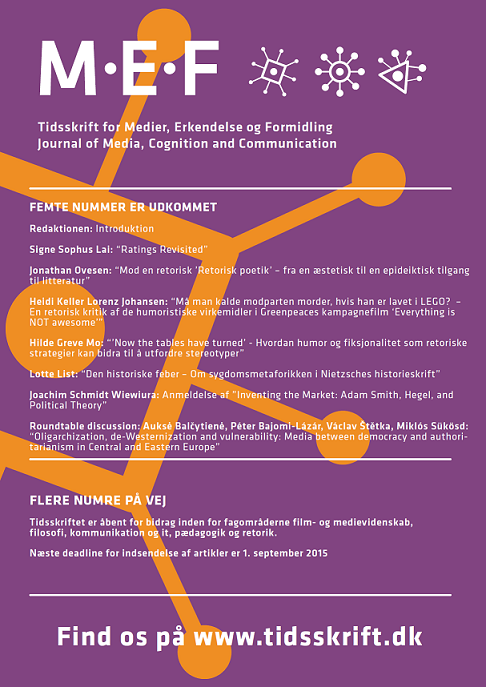”Now the tables have turned” – Hvordan humor og fiksjonalitet som retoriske strategier kan bidra til å utfordre stereotyper
Abstract
Denne artikel analyserer, hvordan humor og fiktionalitet fungerer som retoriske strategier i musikvideoen Africa for Norway, herunder strategiernes potentiale i forhold til at udfordre det ofte misvisende og stereotype vestlige syn på Afrika. Analysens fund diskuteres med Rebecca Higgies (2014) satireteori om det dynamiske spektrum som omdrejningspunkt – og der argumenteres for, at musikvideoens satire kommunikerer en anti-kynisk opfattelse af vestlige mediers fremstilling af bistandsarbejde. Artiklen konkluderer, at fiktionalitet bidrager til afsenderbeskyttelse, cirkulationsværdi og publikumsdeltagelse, og at parodisk satire – gennem inkongruens – eksponerer manglerne ved den originale diskurs og dermed kan bidrage med ny indsigt.
This article analyses how humour and fictionality act as rhetorical strategies in the music video Africa for Norway in order to challenge the often misleading and stereotypical Western view of Africa. Using Rebecca Higgie’s (2014) satire theory of dynamic spectrum to discuss the findings, it is argued that the music video’s satire communicates an anti-cynical view of Western media’s representation of aid work. The article concludes that fictionality contributes to protection of the communicator, circulation value and audience participation. Through incongruence the parodic satire exposes the shortcomings of the original discourse and may contribute with new insights.
Downloads
Published
How to Cite
Issue
Section
License
Creative Commons: CC by-nc-nd


